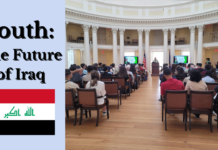University of Virginia Housing and Residence Life hosted its annual event, “The Last Lecture Series,” on April 18, celebrating their 25th Anniversary. The event featured two keynote speakers, Professor of Ethics and Religion, Dr. James F. Childress, and Professor of Psychology, Dr. Melvin Wilson. The event is inspired by Randy Pausch’s “The Last Lecture,” and each year’s speakers attempt to answer the question, “What wisdom would you impart on the world if you knew it was your last chance?”

Although the idea of a “last lecture” is meant to be a hypothetical, Childress is in fact retiring this semester after teaching at UVa for 44 years. Childress is the author of numerous books and articles regarding bioethics, and was appointed by President Bill Clinton to the National Bioethics Advisory Commission in 1996. During his time at UVa, Childress has been awarded the Lifetime Achievement award from the American Society of Bioethics and Humanities and the Thomas Jefferson Award.
Childress addressed methods of resolving conflicts of conscience in healthcare in his lecture, offering ideas for alternative solutions for patients and healthcare providers in situations where the providers ethically object the legal services requested by patients.
Third year student in the College of Arts and Sciences, Kelly Miller, attended the event and is entering a medical field that demands a solid understanding of ethics.
“It really made me think that medical practitioners communicating with the patient about potential options is sometimes more important than providing the care that the physician sees fit, in certain situations,” said Miller.
Wilson discussed his research regarding interventions in low-income, ethnic minority families, talking mainly about his personal experiences growing up in the projects of Pruitt-Igoe in St. Louis, and his journey into academia at the university.
Wilson shared his experiences during the Civil Rights Era, saying that at the time, he didn’t know what the movement was really about. Though he said his parents worried about crime in their public housing development, Wilson said he felt protected and comfortable while growing up, and it was not until after his teenage years his eyes opened to many of the institutional problems facing projects like Pruitt-Igoe.
“Difference is something we should cherish, we don’t cherish the diversity of those around us,” said Wilson. “Especially if you listen to today’s political debates, we’re not doing much cherishing of anybody.”
“We need to understand that there is a context influencing the behaviors of those around us. It’s very, very important that we empathize with the people that we’re working with,” he said.
















